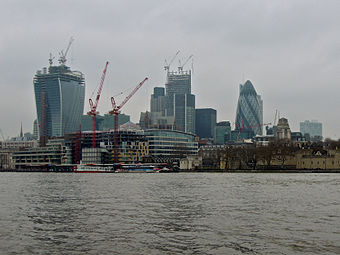 |
| Royal Courts of Justice
Photo Wikipedia
|
Jane Lambert
In July 2014 the HM Courts and Tribunal Service published its Guide to the Intellectual Property Enterprise Court Small Claims Track I have written a lot of articles and given a lot of presentations about that court and its predecessor, the Patents County Court, over the last two years and you will find links to those articles at Patents County Court - the New Small Claims Track Rules 20 Sept 2012.
In this article I will discuss the anomaly that while anyone in the world can appear at a hearing on behalf of a party in the small claims track in most causes of action only a solicitor or other authorized litigator or the party itself can file claim forms or statements of case in that track. That restriction excludes patent and trade mark attorneys who are not authorized to conduct litigation by the Intellectual Property Regulation Board (see Rights to conduct Litigation and Advocacy). I will also consider whether the right of lay representatives to appear as advocates before the Patents County Court continues to apply to proceedings before the Intellectual Property Enterprise Court ("IPEC") small claims track.
S.12 (1) of the Legal Services Act 2007 includes "the exercise of a right of audience" and "the conduct of litigation" in the list of reserved legal activities. S.13 (2) of the same Act restricts reserved legal activities to persons who are authorized in relation to the relevant activity ("authorized persons") and persons who are exempted in relation to that activity ("exempt persons"). It is an offence under s.14 (1) for anyone other than an authorized person or an exempt person to carry on a reserved legal activity.
Paragraph 3 (1) of Schedule 2 to the Act defines a "right if audience" as "the right to appear before and address a court, including the right to call and examine witnesses". In other words the sort of work that barristers do. Paragraph 4 (1) defines "the “conduct of litigation” as
"(a) the issuing of proceedings before any court in England and Wales,These are activities traditionally conducted by solicitors. Activities in relation to litigation such as drafting statements of case and conducting correspondence are not mentioned in the Schedule.
(b) the commencement, prosecution and defence of such proceedings, and
(c) the performance of any ancillary functions in relation to such proceedings (such as entering appearances to actions)."
Schedule 3 to the 2007 Act provides a set of rules to determine whether a person is an exempt person in relation to a reserved legal activity. Paragraph 1 (3) (b) provides that a person is an exempt person if "he has a right of audience before that court in relation to those proceedings granted by or under any enactment." Paragraph 2 (3) (b) makes similar provision in relation to the conduct of litigation.
S.11 (1) of the Courts and Legal Services Act 1990 provides:
"The Lord Chancellor may, with the concurrence of the Lord Chief Justice, by order provide that there shall be no restriction on the persons who may exercise rights of audience, or rights to conduct litigation, in relation to proceedings in a county court of such a kind as may be specified in the order."The only order under that section that I have been able to find is The Lay Representatives (Rights of Audience) Order 1999 SI 1999 No. 1225. Art 3 (1) of the Order provides:
"Subject to paragraph (2), any person may exercise rights of audience in proceedings dealt with as a small claim in accordance with rules of court."However, paragraph (2) of the article states that:
"A lay representative may not exercise any right of audience:–
(a) where his client does not attend the hearing;
(b) at any stage after judgment; or
(c) on any appeal brought against any decision made by the district judge in the proceedings."
This is reflected by paragraph 3.2 (1) of the Practice Direction 27 - Small Claims Track:
"A party may present his own case at a hearing or a lawyer or lay representative may present it for him.""Lawyer" is defined by paragraph 3.1 (1) (a) as "a barrister, a solicitor or a legal executive employed by a solicitor" but not a patent or trade mark attorney and a "lay representative" which would include such an attorney as "any other person".
While the Patents County Court existed there can be no doubt that lay representatives could rely on The Lay Representatives (Rights of Audience) Order 1999 to appear as advocates before the small claims track. However, it is uncertain that they can still do so before the small claims track of IPEC because s.11 of the Courts and Legal Services Act 1990 which was the statute under which the 1999 Order was made applies only to proceedings in the county courts and IPEC is now part of the Chancery Division (see Jane Lambert "What does the Intellectual Property Enterprise Court mean for Litigants in the North West?" 12 Oct 2013 IP North West). Paragraph 63.27 (4) provides that Part 27 (small claims track) shall apply to claims allocated to the small claims track in the Intellectual Property Enterprise Court with certain modifications none of which addresses paragraph 3.2 of the Part 27 Practice Direction.
Although the District Judge can always hear a lay representative in a specific case she does not appear to be obliged to do. Further, there appears to be no right for anyone other than a solicitor or other authorized litigator (which can nowadays include certain counsel and patent and trade mark attorneys) to file, prosecute or defend such proceedings. Should anyone wish to discuss this article or IP Litigation in general he or she should call me on 020 7404 5252 during normal office hours or message me through my contact form.

.jpg/200px-George_Garrard%2C_Whitbread_Brewery_in_Chiswell_Street_(1792).jpg)





